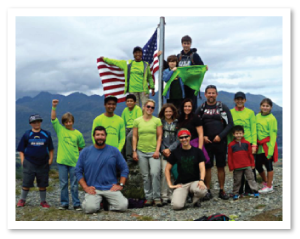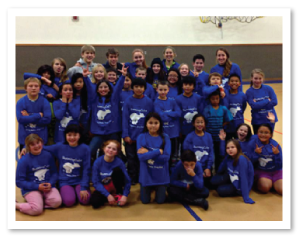
Kodiak Area Native Association Engages Youth for a Healthier Tomorrow


The Kodiak Area Native Association (KANA) provides health and social services to the Alaska Native people of the Koniag, Inc. region. The region encompasses all of the Kodiak Island Archipelago, which is located approximately 150 miles across the Gulf of Alaska from Homer, Alaska. The archipelago is only accessible by boat or airplane-this is also true of the communities within the archipelago. Kodiak Island, the second largest island in the United States, does not have a road system that connects the communities, creating complex challenges that are less common in the contiguous United States.
One of such difficulties includes the lack of music programs in the six villages of the region: Akhiok, Karluk, Old Harbor, Ouzinkie, Port Lions, and Larsen Bay. While the region has approximately 13,000 residents, the majority live in the City of Kodiak, with only 2,000 combined people living in the six villages. The smaller populations make it difficult for the schools to operate a music program. Using MSPI funds, KANA is able to participate in the Village Music Program. The program started more three years ago as a way to bring music programs to middle and high school students to students in the rural villages. Utilizing a web-based video conferencing program, the students are able to receive instruction and practice. The after school programs gives youth the opportunity to develop their creativity and self-confidence while providing them a healthy activity that encourages inclusiveness.
Another popular, MSPI-funded, after school program is KANA's Running Cubs. The program started in 2013 in the City of Kodiak to promote mental health building in fourth and fifth graders. High school cross country runners served as trainers, mentors, and role models for the young students as they trained for a 5K. The program not only encouraged students to develop running skills, it also included discussions on bullying, respect, safe choices, trusting instincts, and reaching out to adults. The debut of the Running Cubs was enormously successful, with over 50 fourth and fifth graders and 4 high school mentors signing up. KANA has been invited back to the elementary school and looks forward to another successful year of programming.
While KANA's programming may seem geared towards youth, there are many pre-existing services available to adult members of the communities through KANA's Behavioral Health Department. KANA regularly holds evidence-based trainings, such as SafeTalk, at no cost to community members. The trainings teach community members how to appropriately respond to people in stress who may be thinking about suicide and engages the community at a deeper level in intervention and community health activities. Local community members have been very responsive, including some local teachers, who are required by the State of Alaska to receive suicide awareness and prevention training. In addition to the trainings, KANA hosts multiple drug and alcohol forums. KANA encourages other MSPI programs to include evidence-based curricula as part of their programing.
KANA strives to create sustainable programming by teaming up with coalitions, agencies, and other tribal entities. Forming a partnership allows the sharing of resources and a larger flow of ideas. Collaborations not only strengthen your program-they'll strengthen your community.
The National Indian Health Board would like to thank Jessica Lacy with the Kodiak Area Native Association for participating in an interview and supplying all of the materials necessary to write this article. For more information or any questions about the Kodiak Area Native Association's programing, please contact Jessica Lacy at [email protected] or 907-486-9812.
National Indian Health Board
50 F St NW, Suite 600 | Washington, DC 20001 | Phone: 202-507-4070 | Email: [email protected]